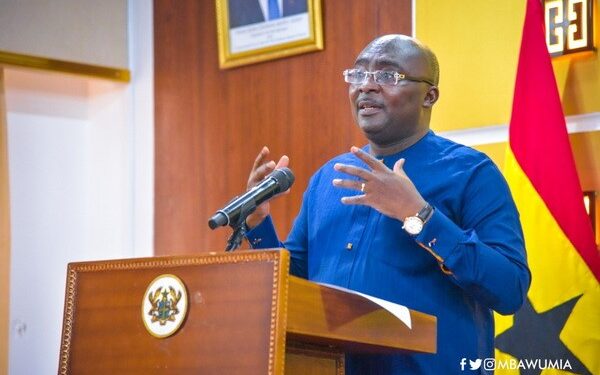Vice President Dr. Mahamudu Bawumia has said Ghana needs fiscal discipline and stronger commitment to building modern systems for sustainable economic development to get the country out of its bailout from the IMF stronger.
Dr. Bawumia stressed that the twin external factors of covid-19 and the war in Ukraine, which he said, has also led many countries to the IMF for support, following rising cost of living and inability to sustain debt levels, has also exposed the need for Ghana to put in place measures to be more fiscal-discipline.
Speaking at the launch of a collaboration between the Accra Business School and South East Technological University of Ireland in Accra, Dr. Bawumia said, the war in Ukraine and Covid-19 which made the country resort to the IMF should be a wake up call for Ghana to be more self reliant.
“The major lesson of the last two years is that we have to be more self-reliant as a country,” Dr. Bawumia said.
“It is important that we take decisions that will inure to the benefit of the country regardless of whether we are going to the IMF for a program or not.”
“The immediate task is to restore fiscal and debt sustainability – through revenue and expenditure measures and structural reforms.
Non-concessional borrowing should be curtailed to enhance debt sustainability,” the Vice President added.
Dr. Bawumia also indicated the long term economic stability the country has failed to achieve after the past 16 bailouts is due to successive government’s failure to ensure long term economic sustainable systems are put in place.
“I should note that Ghana has gone to the IMF for a program 17 times since independence and after each IMF program, the underlying system and structure of the economy remained the same,” Dr. Bawumia said.
“It is important to note that the focus of economic management by successive governments since independence in Ghana has been on crisis management as a result of factors such as the collapse in commodity prices, increase in oil prices, debt unsustainability, political instability, macroeconomic instability, etc. Governments, have by and large, not focused on building systems and institutions that underpin economic activities in a modern economy.”
These modern systems for sustainable economic development, Dr. Bawumia said, are: “the systems that will reduce bribery and corruption, the systems that will make the delivery of public services efficient, the systems that will enhance domestic revenue mobilization, and the systems that will make life generally easier for Ghanaians.”
The Vice President noted that since 2017, government has been focused on building these systems, which include a biometric national identification card, functioning digital property address system and an aggressive financial inclusion programme, digitization of government services and many others, which he said, are enhancing services and making access easier, reducing curruption and strengthening domestic revenue mobilization.
He, therefore, called for a renewed focus on building and strengthening these systems, alongside enhanced fiscal discipline, to ensure sustainable economic recovery after the latest, 17th IMF programme.
By Felix Anim-Appau|Onuaonline.com|Ghana













